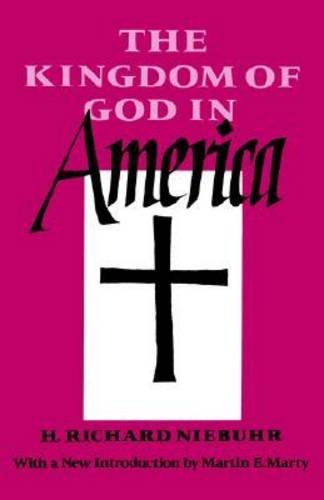A Brief Book Summary from Books At a Glance
by Benjamin J. Montoya
About the Author
H. Richard Niebuhr was one of the most influential American Protestant theologians of the 20th century and a legendary professor at Yale who was considered a leading authority on ethics and the American church. He was a passionate advocate for living out one’s Christian faith authentically in the context of the real world of today.
Introduction
The term “the kingdom of God” is one that is found throughout Scripture, but it is also one that has come to mean different things to various people throughout history. With a focus on American Christianity, what does the kingdom of God mean? What is American Christianity? Is American Christianity true Christianity or is it seeking to use Christianity to achieve its own political purposes? The larger goal of this book is to seek answers to these questions via a historical study to help us better understand our own times.
Table of Contents
Chapter 1 The Problem of Constructive Protestantism
Chapter 2 The Sovereignty of God
Chapter 3 The Kingdom of Christ
Chapter 4 The Coming Kingdom
Chapter 5 Institutionalization and Secularization of the Kingdom
Summary
Chapter 1: The Problem of Constructive Protestantism
To understand the kingdom of God in America, we must first look back to the Reformation itself, particularly so we can understand the primary problem of constructive Protestantism. When we look at the Reformation, we consider how Martin Luther began the Reformation by standing up against the abuses of the Word of God and its doctrines. This led, of course, to the Reformation as we know it. But when we think of the Reformation itself, it is primarily a reactionary movement that is criticizing something. In this case, it was criticizing what the Catholic Church was doing at the time, in so many ways. Thus, it was not primarily focused on constructing something as it was criticizing something else.
The Reformation itself was not a movement without its own criticisms that would have to be addressed later; for example, one of the most common is that it would result in immoral behavior since there was no longer any order that the Catholic church had previously provided. This would continue to be an issue to be dealt with throughout Church History, but Protestants certainly would speak to morals and how to live in light of God’s Word.
When a movement is primarily a movement that seeks to point out the errors of something, that same movement, then, can have a difficult time pointing out problems to transitioning to providing a constructive alternative. And that is the primary problem of constructive Protestantism. It had no way of pointing forward to something new in any kind of unified way. That is part of the reason why there are so many variations of Protestantism. John Calvin had his own version of what this would look like in Geneva, but so did others elsewhere. The Catholic leaders of the time rightly pointed out that Protestants would keep splintering off like this since there was no guiding organization. Part of what led people to America was to seek to build what Christians at the time understood as the kingdom of God on this earth. It was partially seen as a way to move to accomplish just that. . . .
[To continue reading this summary, please see below....]The remainder of this article is premium content. Become a member to continue reading.
Already have an account? Sign In
